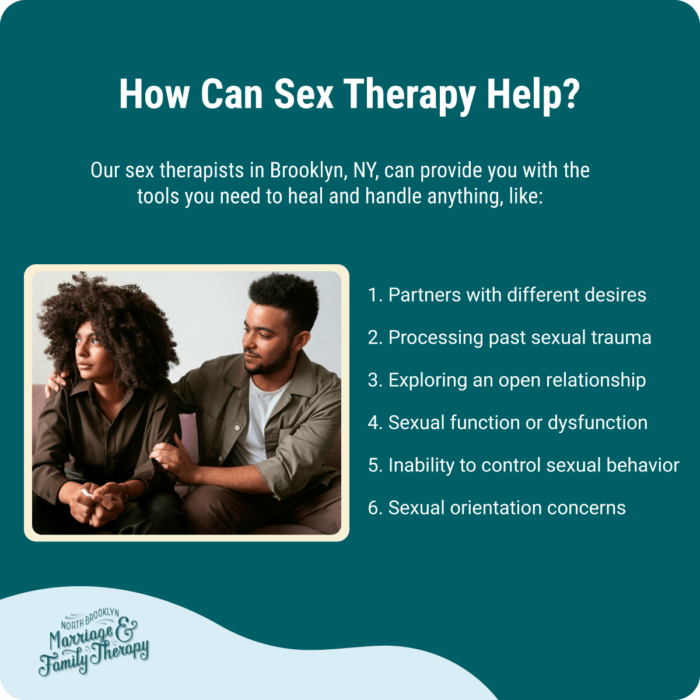Sex Therapy in Brooklyn, NY
Our sex therapists in Brooklyn, NY have extensive experience dealing with all types of sexual concerns. We offer nonjudgmental but compassionate insight into every situation — we understand, and we’re here to help.
What Is Sex Therapy?
Sex therapy is a type of psychotherapy that helps you start a conversation around a variety of issues such as sexual function, sex addiction or desire, concerns around past sexual trauma and anxiety. It’s quite literally an intimate subject — and one that requires a delicate, experienced approach.
If you find it hard to talk about sex or find yourself lost in how to have these important conversations, you’re not alone. Our sex therapists in Brooklyn, NY, can help you explore these feelings in a safe, comfortable, and non-judgmental environment.
How Can Sex Therapy Help?
If your relationship lacks intimacy, there are struggles with sexual dysfunction, or you’re experiencing difficulty communicating about any other issues, it might be time to speak to a sex therapist.
Sex counseling can provide you with the tools you need to heal and handle anything, like:
- Partners with different desires
- Processing past sexual trauma
- Exploring an open relationship
- Sexual function/dysfunction
- Inability to control sexual behavior
- Sexual orientation concerns

How Does Sex Therapy Work?
Couples will begin by talking through their general challenges, sexual history, and any background information relevant to the main issue at hand. Initial sex therapist sessions in our Brooklyn office involve discussing concerns, creating a specific treatment plan, and deciding whether sessions should be individual or with partners together.
As therapy progresses, you will be given the tools you need to create a healthy sex life and find better ways to manage your sexual relationship in a supportive and nurturing environment.
New patients should be aware that sex counseling or sex addiction therapy does not involve any type of physical contact or examination. If you need physical medical attention, you should contact your health physician.
Sex counseling is a nurturing, safe space to explore:
- Emotional issues around sex
- Concerns around performance anxiety, pleasure, and sex education
- Different ways of communicating
- Slowing down and practicing mindfulness during intimate encounters
- Changing the way you interact (both sexually and nonsexually)
Our sex therapists will also check for any underlying mental health issues that might be preventing a healthy sex life between couples.
When Should a Couple See a Sex Therapist?
A healthy sex life isn’t determined by frequency. When it comes to a good sex life, quality is far more important than quantity. If you and your partner are only making love once a month, but you’re both satisfied, you’re doing great.
However, problems arise when you or your partner aren’t satisfied, emotionally, mentally, or physically. If you’ve noticed any of these issues in your relationship, consider scheduling a couples sex therapy session with the team at North Brooklyn Marriage & Family Therapy:
- One person does all the initiating. If you’re the one who always initiates sex, you may end up feeling rejected and resentful.
- You don’t talk about what you want in sex. After you’ve settled into your relationship, you can still have different motivations. You might want to have sex to feel good and relieve some stress while your partner is looking for a deeper connection.
- You do the same things every time. Repetitive sex can dampen excitement and your desire may dwindle.
- Your mind wanders during sex. If you find yourself frequently checking out during sex, you’re doing yourself and your partner a disservice.
- You don’t feel connected afterward. You’re missing out on an opportunity to foster intimacy and connection in your relationship.
- You’re not having sex at all. If you and your partners aren’t having sex at all and aren’t being intimate in any way, it could be a sign of a more significant issue.
Why to Choose Our Sex Therapists
Sex Therapy Can Be Tough — We Make It Simple


